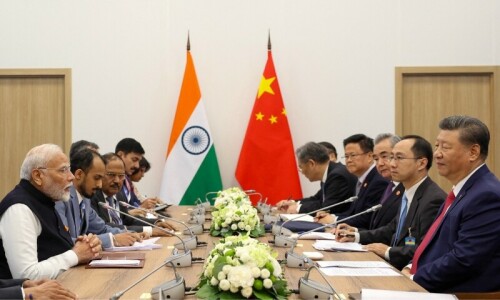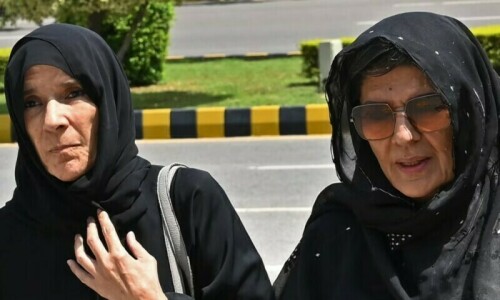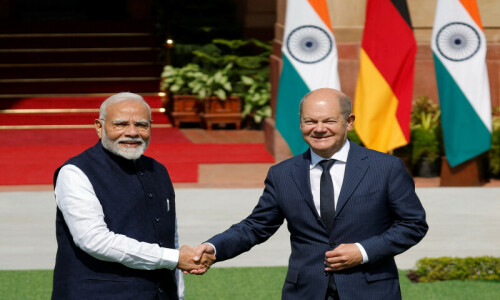THEY are all dead: the feisty Italian journalist Oriana Fallaci and her 14 interviewees — prominent amongst them Henry Kissinger, King Hussein of Jordan, Yasser Arafat, Mrs Golda Meir, Indira Gandhi, Zulfikar Ali Bhutto, Mohammed Reza Shah Pahlavi, the Cypriot president Archbishop Makarios, and the Vietnamese freedom fighters Gen Giap and Nguyen Van Thieu. All that remains are their words, uttered during the often provocative, testy conversations she had with them, later published in her book Interview with History (1976).
Fallaci mistrusted history. She felt it was “a novel full of events” and second-hand judgements. She preferred modern reportage: “Today’s history is written the very moment it happens [.] It can be transmitted immediately through the press, radio, television.”
Fallaci, a consummate professional, taped every interview. Often though, these precautions were not enough. The tapes of her sessions with Israeli leader Golda Meir mysteriously disappeared from a locked hotel room in Rome. Col Qadhafi’s detailed mention of their contents made Fallaci suspect him of masterminding the theft. She transcribed her notes faithfully but found that some of her interviewees like Gen Giap wanted her to print only their version. She humoured Giap, and then printed her own report with it. (Her interview with Giap so impressed Dr Kissinger, he agreed to be interviewed by her.)
Others regretted their remarks afterwards and demanded that their indiscretions should be excised. Dr Kissinger did not share her humour when she quoted his admission that he saw himself as “an amazing, romantic character [,] the cowboy who rides alone into the town with his horse”.
Fallaci mistrusted history, preferring modern reportage.
Fallaci is kinder to Yasser Arafat, accepting his ascetic assertion that he remained a bachelor because he was married to Palestine. (He took a second human wife later).
She found nothing to praise in the wily prelate Archbishop Makarios: “He has the gift of survival, gained and regained through fast stepping, contortions, cleverness, cynicism.” She catches him out with the recollection of a party (which he attended and enjoyed) featuring “a wild belly dance”. He did not deny his earthy observation that “the beauty of a woman is a gift of God”.
For many in the subcontinent, Fallaci’s interviews with Mrs Indira Gandhi in February 1972 (fresh after success in midwifing Bangladesh) and Z.A. Bhutto’s impatient riposte in April are riveting even today.
Fallaci recalled that Kissinger had described Bhutto as “very intelligent, very brilliant”, and Mrs Gandhi in a single derogatory word rhyming with rich. She noted Bhutto’s opinion of Mujibur Rahman: “A congenital liar [.] He talks at random, depending on his mood and the disorders of his sick mind.”
Of Mrs Gandhi, Bhutto had no softer words: “She’s a mediocre woman with a mediocre intelligence [.] A diligent drudge of a schoolgirl, a woman devoid of initiative and imagination.” He told Fallaci: “What bothered him was the prospect of an honour guard from the Indian army and physical contact with her.” (Nevertheless, he shook hands with her at Shimla three months later.]
Bhutto’s vanity knew no bounds. An apocryphal story is that in October 1963, president John F. Kennedy met Bhutto. Kennedy told him: “Too bad you are not American, because if you were, I would have appointed you to my cabinet.” Bhutto retorted: “If I was American, I would not be in your cabinet but president of the United States!”
“What did Mrs Gandhi say about me?” he asked Fallaci. Mrs Gandhi had told her: “Bhutto is not a very balanced man. When he talks, you never understand what he means.” She resisted the bait in Bhutto’s daring suggestion of a confederation with India. In his own interview with Fallaci afterwards, Bhutto boasted that “if India and Pakistan were to become confederated countries, I’d have no trouble in carrying off the post from Mrs Gandhi. I am not afraid of intellectual confrontations with her.”
From New Delhi, a stung Mrs Gandhi asked for a full transcript of the Bhutto interview. A contrite Bhutto immediately sent his ambassador in Rome to persuade Fallaci to ‘kill’ the interview, to aver that his remarks about Mrs Gandhi had been ‘imagined’ by Fallaci. She refused. Today, against the backdrop of Narendra Modi’s strident BJP chauvinism, Mrs Gandhi’s question to Fallaci, even half a century later, remains unbearably poignant: “How is it possible for people [to] kill each other for religion?” She added this humane advice for her successor Modi: “Minorities cannot be eliminated from a country.”
Modern interviewers could learn from Fallaci’s forensic subtlety. While she used a scalpel, they prefer the hacksaw. Today’s media is less a fount of informed disclosure than a noisy abattoir, in which interviewers turn butchers and their subjects become bloodied victims.
The writer is an author.
Published in Dawn, May 23rd, 2024











































Dear visitor, the comments section is undergoing an overhaul and will return soon.